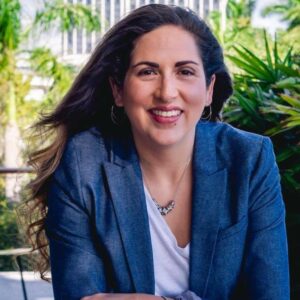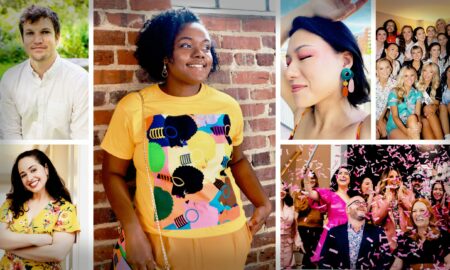 Today we’d like to introduce you to Michelle Addison.
Today we’d like to introduce you to Michelle Addison.
Hi Michelle, thanks for sharing your story with us. To start, maybe you can tell our readers some of your backstories.
I am a first-generation, Latina, originally from Miami, Florida. I went to Northwestern for college and law school. I started my career as a corporate M&A attorney, but I’ve always had an entrepreneurial spirit. When my first daughter was born in 2010, I left my career at my big, international law firm, and decided to start my first entrepreneurial venture. My first company was in the childhood education space. Soon after, I started my second company, a healthcare practice. I’ve always started companies to solve a problem I personally face or that I see others in my life facing. Allergood is no different. I have 3 kids with food allergies and I developed an adult-onset allergy myself. I started a food-allergy related blog in 2010 and became a food allergy advocate as a result. During the pandemic, I realized that technology had touched every aspect of our lives, except our experience dining out with food allergies. For over a decade, we had been emailing restaurants to vet menu items before our visits, we’d been communicating with servers and engaging in back-and-forth conversations with servers and chefs that often too over 30 minutes, and we ate our meals with a nervous energy, never having full grasp on whether a meal was actually “safe.”
I got the idea for Allergood and wasn’t sure where to start because Allergood is a tech company and I am not a technical founder. I decided to apply for my MBA as a way to gain access to technical resources and startup expertise. Thankfully, I received a Forté Fellowship at Duke’s Fuqua School of Business. So, in the middle of the pandemic, my husband and I sold our businesses, sold our house, and moved from Florida to North Carolina with our three kids to go all-in on Allergood. Fuqua gave me the network, resources, and support that I needed to graduate in May with a fully-working Allergood MVP and successful pilots running at several Triangle-area restaurants.
We all face challenges, but looking back, would you describe it as a relatively smooth road?
Being a startup founder is never a smooth road. In fact, you can ride a roller coaster of emotions, from the highest of highs to the lowest of lows all in one day.
The first obvious struggle that I faced was being a non-technical founder trying to start a tech company. I was also trying to do this while running my healthcare practice, which is no easy feat. Deciding to apply for my MBA was my way around this challenge, but it involved studying for the GRE and writing application essays from 11pm – 4am most nights after a full day of work and post-work mothering. Once I was admitted to Fuqua, I took control of my journey, involving myself in every entrepreneurial resource offered to students Duke-wide, Thanks to Dr. Jamie Jones at the Duke’s Center for Innovation and Entrepreneurship, I was able to tap into all the resources I needed to get to a revenue-producing product.
Being a Latina founder has its challenges, too. Historically, we receive less than 2% of all VC funding. As a first-generation Latina, I also don’t have the family resources that many founders do to help finance the early stages of my startup. This has forced me to be scrappy. Once again, seeking out opportunities has been crucial for me. I was accepted to VHLX, an accelerator for LatinTech entrepreneurs run by Visible Hands in partnership with Google for Startups, which came with a small grant. I won the Inicio Ventures Latinx Campus Fund grant and various grant opportunities through Duke. I’ve also won pitch competitions that have included small monetary prizes. As a result, I’ve been able to get Allergood where it is today solely through grant and prize money. Being bootstrapped is a challenge of its own. It means making smart choices and being creative about how you tackle growth, but it also means you’re in charge of your own journey.
We’ve been impressed with Allergood, but for folks who might not be as familiar, what can you share with them about what you do and what sets you apart from others?
Allergood is a B2B vertical SaaS company that instantly filters menus for allergens and dietary preferences, helping companies boost revenue and customer loyalty, while drastically reducing risk. With Allergood, users scan a QR code, enter their allergens and dietary preferences, and then the menu is automatically filtered for them, showing them the items that are safe to eat. What makes Allergood unique is that we don’t only show you the dishes that are “all good” without modifications, we also show you what modifications you need to make to a dish to make an item safe for you. That way, you can order it exactly how you need to so that it’s safe for you, without having to have extended conversations with the server or the kitchen. For example, if an item needs to be prepared in a separate pan to be safe, we show that information. We also show cross-contamination that the end user should be aware of, like a shared fryer that contains gluten or dairy, so that the user can make an informed decision. If an item can’t be made safe because it’s just too risky, that item doesn’t show up on our app. So, a user isn’t tempted by an item just to find out that they can’t have it because that’s such a letdown.
Allergood isn’t just for restaurants. Our software is useful anywhere that customers eat outside of the home. While we started with restaurants as our initial cohort of customers, we are now looking at areas beyond restaurants where we can grow and make a positive impact.
We sell B2B and leave the software free to the end user because this is more than a “nice” offering for food service providers. Allergood has huge benefits on the business side. First, we dramatically cut risk. By partnering directly with food service providers, we source our information from vetted recipes and ingredients. This eliminates the human error that can result from untrained staff or decisions made with limited information during busy service. Allergood also increases revenue and customer loyalty. When customers know what’s safe to eat and they can see a variety of options available to them, they order more and therefore spend more. Instead of ordering a plain chicken breast and a side of steamed broccoli, they order an appetizer, and entrée, and a dessert! They also come back more often and they bring their friends, Allergood is a win-win for everyone.
How do you think about luck?
Luck isn’t something that I credit with where I am in my life and business. I credit hard work, perseverance, and resilience with where I am today. Nothing has come to me by happenstance. I’ve had to make sure I am in the room where it happens. I’ve had to make sure that I am seeking out the opportunities. I have had to put in the work to ensure I am where I am. This doesn’t mean I am closed off to luck — I welcome it with open arms!
Contact Info:
- Website: https://www.allergood.com
- Instagram: https://www.instagram.com/go_allergood
- Facebook: https://www.facebook.com/p/Allergood-100078450173086/
- Twitter: https://www.twitter.com/allergood
- Linkedin: https://www.linkedin.com/in/michelle-addison/
- Email: [email protected]











